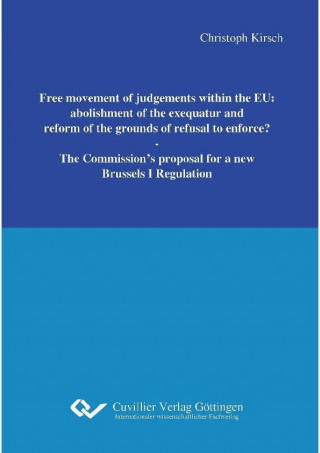
Kód: 13414808
Free movement of judgements within the EU
Autor Christoph Kirsch
On 14 December 2010 the European Commission presented its Proposal to amend the most important instrument on European international civil procedure, the Regulation 44/2001 (żBrussels I`). Against the background that European law g ... celý popis
- Jazyk:
 Angličtina
Angličtina - Vazba: Brožovaná
- Počet stran: 72
Nakladatelství: Cuvillier, 2012
- Více informací o knize

Mohlo by se vám také líbit
-

Dune
262 Kč -

Haunting Adeline
617 Kč -

Berserk Deluxe Volume 2
1093 Kč -

White Nights
78 Kč -

Powerless
259 Kč -

Atomic Habits
339 Kč -

Dune Messiah
178 Kč -

Berserk Deluxe Volume 3
1138 Kč -

One Day
276 Kč -

Berserk Deluxe Volume 1
1112 Kč -

Iron Flame
352 Kč -

Surrounded by Idiots
256 Kč -

Harry Potter and the Prisoner of Azkaban (Minalima Edition)
688 Kč -

Gravity Falls Journal 3
440 Kč -

Heaven Official's Blessing: Tian Guan Ci Fu (Novel) Vol. 1
440 Kč -

The Creative Act
586 Kč -

Dune
250 Kč -

Hunting Adeline
625 Kč -

A Little Life
276 Kč -

Children of Dune
174 Kč -

Heaven Official's Blessing: Tian Guan Ci Fu (Novel) Vol. 2
441 Kč
Darujte tuto knihu ještě dnes
- Objednejte knihu a zvolte Zaslat jako dárek.
- Obratem obdržíte darovací poukaz na knihu, který můžete ihned předat obdarovanému.
- Knihu zašleme na adresu obdarovaného, o nic se nestaráte.
Více informací o knize Free movement of judgements within the EU
Nákupem získáte 63 bodů
 Anotace knihy
Anotace knihy
On 14 December 2010 the European Commission presented its Proposal to amend the most important instrument on European international civil procedure, the Regulation 44/2001 (żBrussels I`). Against the background that European law guarantees economic freedoms cross-border recognition and enforcement of judgments within the European Union is of considerable and increasing importance. Brussels I provides for a simple and accelerated procedure to obtain the required declaration of enforceability (the exequatur) in the Member State of enforcement. In order to further enhance the free movement of judgments within the EU the general abolishment of this exequatur lies at the heart of the Proposal. It is accompanied by plans to reform the existing defences.This dissertation provides an analysis and discusses the most relevant aspects of the abolishment of the exequatur and the reform of the defences under the Proposal. After providing the background on the Proposal and its underlying principles, the cross-border enforcement regimes of Brussels I and the Commisson`s Proposal are briefly presented. The abolishment of the exequatur is critically discussed with regard to its underlying rationales and the functions of the exequatur. The chapter concludes with the implications of the abolishment for the existing defences. The reform of the defences is discussed in debt in the third chapter with regard to the questions whether the Proposal provides sufficient protection and complies with the principle of mutual recognition. Particular emphasis is put on the ordre public defence and its fundamental rights implications. Suggestions to amend the Commission`s Proposal are made throughout the paper and briefly summarised in the final conclusion.
 Parametry knihy
Parametry knihy
634 Kč
- Plný název: Free movement of judgements within the EU
- Podnázev: abolishment of the exequatur and reform of the grounds of refusal to enforce?. The Commission`s proposal for a new Brussels I Regulation
- Autor: Christoph Kirsch
- Jazyk:
 Angličtina
Angličtina - Vazba: Brožovaná
- Počet stran: 72
- EAN: 9783869559841
- ISBN: 3869559845
- ID: 13414808
- Nakladatelství: Cuvillier
- Hmotnost: 95 g
- Rozměry: 210 × 148 × 4 mm
- Datum vydání: 16. January 2012
Osobní odběr Praha, Brno a 12903 dalších
Copyright ©2008-24 nejlevnejsi-knihy.cz Všechna práva vyhrazenaSoukromíCookies



 Vrácení do měsíce
Vrácení do měsíce 571 999 099 (8-15.30h)
571 999 099 (8-15.30h)